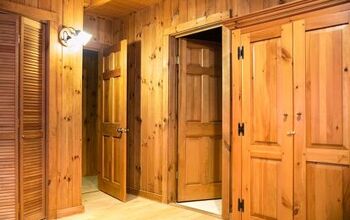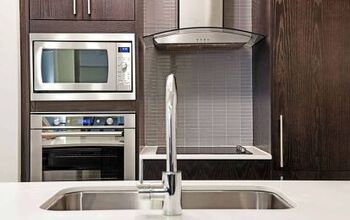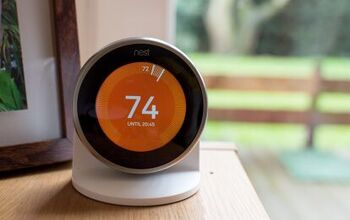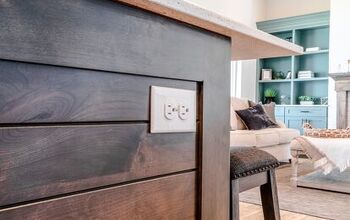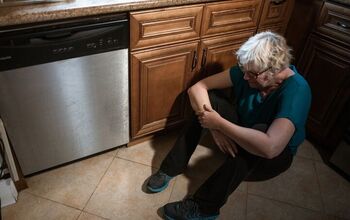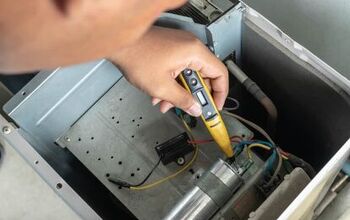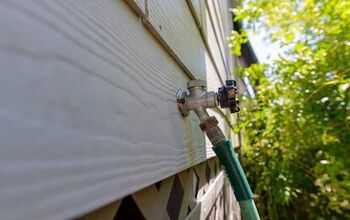How Long Does A Smoke Detector Last? (Find Out Now To Stay Safe!)

Smoke detectors are some of the most overlooked and underappreciated appliances in your home. Mounted up high and out sight, they often go out of mind as well. For you and your family’s safety, you should be asking how long does a smoke detector last?
Smoke detectors last between 8 and 10 years, and it is recommended that you change them every 10 years. You can inspect the smoke detector to find out how old it is, and you can tell it needs to be replaced if it chirps. Smoke detectors can trigger and raise an alarm when there is no smoke if they are close to 10 years old.
Smoke detectors use different means to perform their job. Over time, the methods used by smoke detectors become less effective. Eventually, the smoke detector will lose its ability to detect smoke and needs replacing. Understanding how smoke detectors work and where to place them in your home is critical.
Do You Need to Hire an Electrician?
Get free, zero-commitment quotes from pro contractors near you.

Understanding Smoke Detectors – How Do They Work?
Small and unassuming smoke detectors play an important role in keeping you and your family safe. The NFPA reports that three of every five fire deaths that occur in homes without working smoke detectors. Some of these deaths occurred in a home with smoke detectors that were not working.
Some detectors come in two varieties, ionizing detectors and photoelectric detectors.
Ionizing Detectors
Ionizing detectors contain a small piece of radioactive material. This extremely small piece of material resides between two metal plates. An electrical source connects to these metal plates. The small piece of radioactive material ionizes the air between the plates and electrical current results.
If the air is clear, the current between the plates continues to flow. When smoke enters the smoke detector, it disrupts the current and the alarm sounds. Over time, the radioactive source weakens and can no longer ionize the air.
Photoelectric Detectors
Instead of a radioactive source and electrical current, photoelectric smoke detectors use light to sense smoke. Photoelectric detectors don’t depend on smoke to interrupt a light beam. Instead, these detectors only sound an alarm when enough smoke is in the smoke alarm to reflect the light beam onto the sensor.
The common thread in both styles of smoke detectors is the need for an electrical source. In most home smoke detectors, this is a battery which should be changed every year. Some homes may have smoke detectors wired into the home electrical system or part of a home security system. In any case, all detectors need to change when they are ten years old.
Which is Better: Ionizing or Photoelectric Smoke Detectors?
Photoelectric smoke detectors are generally better at sensing fires that begin by smoldering for long periods. These types of fires are common in homes with smokers. A dropped cigarette in a couch or chair cushion usually results in a smoldering type of fire.
Ionizing detectors work best at sensing the smoke produces by open-flame burning. In homes, one of the most common sorts of fires is grease fires in the kitchen. These fires, which often involve grease, produce rapid, open flames and lots of dense smoke.
The National Fire Protection Association recommends that homeowners install both types of smoke detectors for the best protection possible. Locating these detectors in the proper places in your home is the key to protecting you and your family.
Finding the Right Spots for Smoke Detectors
The correct placement of smoke alarms in your home is the foundation of a good fire safety program. The National Fire Protection Association offers a comprehensive user guide locating and installing smoke detectors. This guide is available for free at this link.
In general, the NFPA makes the following recommendations about installing and locating smoke detectors in your home.
- Only use smoke detectors that have the label of a recognized testing laboratory
- Put a smoke detector in each sleeping area.
- Each hallway or passage area should have a smoke detector, especially hallways leading to bedrooms.
- Put a smoke detector near the bottom of the stairways
- The den or living area of your home should have a smoke detector.
- In basements, put the smoke detector near the bottom of the stairs.
- Don’t put a smoke detector closer than 10 feet to your cookstove
- If your ceilings are sloped, place the smoke detector up high. Keep the smoke detector at least 4 inches below any peak.
- Avoid putting smoke detectors near windows or exterior doors
- Avoid painting smoke detectors
- Install both photoelectric and ionizing detectors for the best protection. Some companies make combination detectors
Test Buttons
What if your smoke detectors are more than 10 years old, but the test button is still functioning?
Smoke detectors do come with a test button. However, the test button does not test the ability of the smoke detector to detect smoke. The only thing tested when you push the button on your smoke detector is the condition of the battery and the alarm buzzer or siren.
The test button is a convenient way to make sure the battery is working and that the smoke detector will make noise. There is no way to test the detector part without subjecting it to smoke. Doing a smoke test is usually not something you want to do in your home.
Which is Better? Hardwired Smoke Alarms or Battery Powered Smoke Alarms
Both types of smoke alarms work and that is the main issue. Many people opt for hardwired smoke alarms thinking that the home’s electrical power is more dependable than batteries. They are also under the impression that hardwired smoke detectors eliminate the need to change batteries once a year.
What many people don’t realize is that hardwired smoke detectors also have batteries. The batteries in hardwired smoke detectors act as a backup in case the electricity fails. Just like the batteries in smoke detectors that are not hardwired, you should do an annual battery change.
Interconnected and System Smoke Detectors
The advent of wireless technology has made an impact on the smoke detector industry as well. Many homeowners are installing home automation and security systems that include smoke detectors. Many homeowners buy packages from the alarm company that includes a smoke detector.
A single smoke detector in most homes is not enough. If you are installing a networked home security system, you should follow the same standards for locating the smoke detectors. Remember that the salesman from the alarm company is not an expert in home safety. He is an expert in selling home security systems.
Do Smoke Detectors Save Lives?
According to the National Fire Protection Association, fire departments reporting in the United States revealed the following.
- In residential structure fires, smoke alarms were present in 74 percent of the homes
- Where there were smoke alarms present, the smoke alarm operated 53% of the time
- Three of five fire deaths occurred in homes with no smoke alarms
- Your chances of dying in a residential fire are almost twice as great in a home with nor smoke detectors
- Dead batteries are responsible for at least one-quarter of the smoke alarms that fail to operate in a fire
The answer is yes. Smoke alarms do save lives and your chances of surviving a fire in your home rise dramatically if the smoke detectors are working.
Smoke Detector Maintenance Tips
Just like anything else, smoke detectors require at least a minimal level of maintenance. The National Fire Protection Association recommends that you should do the following monthly.
Replace the Batteries Once a Year
Pick a date and make that the official battery change date for all your smoke detectors. Many people change the batteries in their smoke detectors on the change from regular time to Daylight Savings Time. Others choose a birthday or other significant date.
Whatever date you choose, replace the batteries in every smoke detector in your home with fresh batteries. Don’t forget that most hardwired smoke detectors have back up batteries as well.
Test All Your Alarms
While the test button does not test the actual sensing system, it is good to push that button and hear the alarm activate routinely. This monthly routine is a good way to reassure yourself that the batteries are good, and the siren or buzzer is operational.
AN easy way to perform this test is to use the handle of a broom or mop to depress the test button. You can do this test during routine cleaning. Nothing says that you must only perform a smoke detector test once a month. Use the broom or mop every time you walk under that smoke detector.
A Clean Smoke Detector is a Happy Smoke Detector
You don’t need to get a ladder and take your smoke detector apart to clean it. When vacuuming your home, extend the wand on your vacuum and give the smoke detector a quick clean.
Using the vacuum outside your smoke detector will keep dust and cobwebs from accumulating and possibly clogging the air intake. A quick swipe with the dusting brush on the end of the vacuum wand is all that is necessary.
Do You Need to Hire an Electrician?
Get free, zero-commitment quotes from pro contractors near you.

Be Safe and Be Aware
Smoke detectors save lives. There is no question that properly located and maintained smoke detectors are a great way to protect your family. But smoke detectors can only save your family if they work.
Smoke detectors need routine maintenance. Batteries need to be changed and you should clean your smoke detectors occasionally. If your smoke detectors are more than ten years old, replace them with fresh new units.
Hopefully, you will never awake to the shrill sound of a smoke alarm going off. However, if you do, the time they afford you may make all the difference in the world to you and your family’s health and safety. Change your batteries and be safe.

Dennis is a retired firefighter with an extensive background in construction, home improvement, and remodeling. He worked in the trades part-time while serving as an active firefighter. On his retirement, he started a remodeling and home repair business, which he ran for several years.
More by Dennis Howard



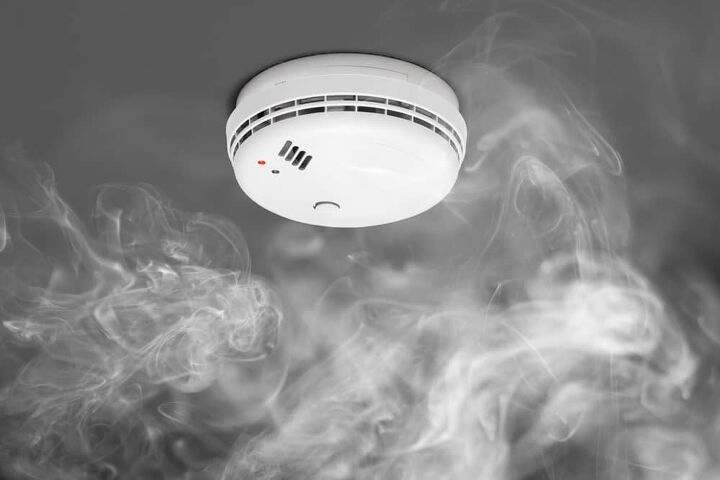






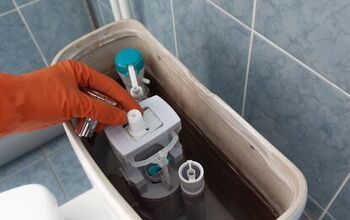
![Finishing Basement Without Permit [Is It Really Illegal?]](https://cdn-fastly.upgradedhome.com/media/2023/07/31/9070078/finishing-basement-without-permit-is-it-really-illegal.jpg?size=350x220)

